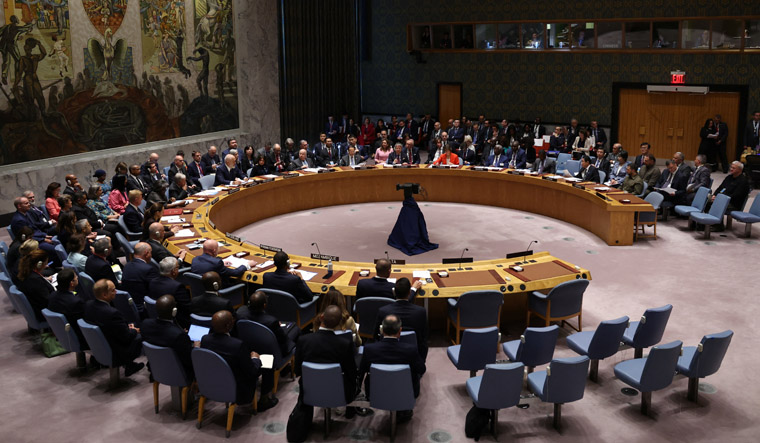I have visualised the emergence of India as a modern industrial giant, like the USA or China, in the next 10-15 years or so after a historical revolutionary struggle.
This event will change world history. Let me explain.
The world is largely ruled by a small group of powerful nations which dominate over others. After the end of the Second World War in 1945 the United Nations was set up, which reflected this situation. A Security Council was created making five powerful nations alone its permanent members with veto powers, relegating other countries to inferior status.
India too, despite its huge population, was treated as one of such inferiors, and so it will remain as long as it is poor and relatively backward.
But an earth-shaking transformation of India, which I foresee, into a modern industrial giant, despite stiff opposition from powerful countries, will radically alter all this.
Now India will no longer be largely irrelevant on the world stage and instead will become a frontline player.
This will change the course of world history in the following ways:
1. At present two alliances of powerful nations exist in the world: the USA-Europe alliance and the China-Russia alliance. Though they are restrained from direct conflict by the existence of nuclear weapons, which all have, their hostility to each other is nevertheless a great potential danger to world peace.
In this situation, the historic rise of India as a mighty industrial nation will play a crucial role in preserving world peace. India will not ally itself with either of these two alliances but will stand as a buffer between them, cooling down the situation, and working for world peace.
2. While the countries of the present two alliances care only for their own interests, and not for the interests of the underdeveloped countries, the new modern highly industrialised India will do the opposite. It will take it as among its historic tasks not only abolishing poverty, unemployment, hunger, etc., in India but also helping underdeveloped countries become developed and prosperous, realising that unless that happens there can be no peace in the world.
The new India will not use its massive industry to exploit poor countries like an imperialist power but instead use it to help them in every way.
For instance, it will not patent its medical discoveries to make profits (as all rich countries do) but will make them freely available all over the world, realising that medical care is the right of all human beings, and cannot be made a business.
3. At present, the developed countries oppose tooth and nail the transformation of underdeveloped countries into developed countries, fearing that with their cheap labour, the latter will destroy the former's industries if they too get industrialised, throwing tens of millions of people of the developed countries out of employment.
But the new modern highly industrialised India will want the whole world to become highly industrialised and prosperous, and not keep people of the underdeveloped countries as ''hewers of wood and drawers of water” as they were in colonial times.
To attain this end, it will exert all its newly found might.
The 21st century will be characterised as the century in which the historic peoples’ struggles all over the world will be fought out to a conclusion, resulting in the creation of a new world order, free of these evils.
India will be giving leadership to the world in this century. Let me explain.
Before the Industrial Revolution in England in the first half of the 18th century, the world was dominated by feudal agricultural societies. Their methods of production were backward and primitive.
For instance, the bullock was used for tilling the land in India, the buffalo in Thailand, Vietnam, etc, and the horse in Europe. There were no tractors or other modern machinery.
Consequently, little wealth could be generated. Only a handful of people such as kings, aristocrats, landlords, etc, could be rich, while over 95 per cent of the people had to be poor. When the cake was itself small, very few people could partake of it.
This drastically changed after the Industrial Revolution. Now, modern industry has become so powerful and so big that enough wealth can be generated to give a decent life to everyone in the world, and no one needs to be poor.
Yet, despite this, about 75 per cent of the global population especially in underdeveloped countries, remains poor, many without employment, proper food and healthcare, and good education.
This world is really two worlds: One comprising developed countries like the US, Canada, Europe, Japan, Australia, and now China and the second, underdeveloped countries in Asia, Africa and Latin America.
The aim of the underdeveloped countries must be to break into the ranks of the developed countries by rapid industrialisation, for only if they create a massive industry can they abolish the evils of poverty, unemployment, malnourishment, lack of healthcare, etc.
India is the most developed of the underdeveloped countries. It has a huge pool of technical talent (Indian IT engineers are largely manning Silicon Valley in California, and there are many Indian professors in American universities in the Science, Engineering, Mathematics and Medical departments). India also has immense natural resources.
It is therefore potentially an industrial giant, like the US or China, and our goal must be to break into the ranks of the developed countries as China did.
Following our lead, other underdeveloped countries will do the same, resulting in the whole world being developed.
Justice Markandey Katju retired from the Supreme Court in 2011.
The opinions expressed in this article are those of the author and do not purport to reflect the opinions or views of THE WEEK.



